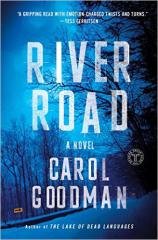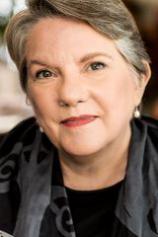Author Talk: February 11, 2016
Carol Goodman is the critically acclaimed author of 14 novels, including THE LAKE OF DEAD LANGUAGES and THE SEDUCTION OF WATER, which won the 2003 Hammett Prize. RIVER ROAD is her most recent book, and it tells the story of a woman who --- after hitting a deer while driving home from a holiday party --- is suspected of killing a young girl in a hit-and-run accident. In this interview, Goodman discusses the real-life incidents that inspired RIVER ROAD’s various narrative threads, the benefits and pitfalls of empathizing so deeply with every protagonist she writes, and why she believes all writing is motivated by “a desire to make the risky trip to the Underworld, and to bring someone or something back from the dead.”
Question: Where did the idea for RIVER ROAD originate?
Carol Goodman: In January 2013, I was driving home from a weekend trip to Boston with my husband when I hit a deer. It was dusk, the end of a long day, and the deer came out of nowhere. I pulled to the side of the road, crying, so upset my husband was more alarmed by my reaction than hitting the deer. We got out to look for the deer but couldn’t find it. My husband reassured me that the deer was probably all right. I tried to believe him. But for the next days, the feeling of that impact, that awful thump, stayed with me. I told people the story and wrote about it; I even wrote a poem for a class I was teaching, trying to exorcise the experience.
Then, a week or two afterward, something truly tragic happened. Two young girls, students at Bard College, were killed in a hit-and-run. My daughter, who was going to Bard at the time, emailed me early the next morning so I’d know she was all right. The incident happened just a few miles from my house, to girls the same age as my daughter, at my daughter’s college. Like everyone in the college and town community, I was struck by the tragedy. I read the emails from the college president, the police report, watched video of the suspect (who was caught a mile down the road buying beer, one of the girl’s phones stuck in her bumper) walking into court. I heard people talking about the incident in the supermarket, the café where one of the girls worked, and amongst my daughter’s friends. I was, of course, devastated for the girls and their parents most of all, but I also found myself thinking about the woman who had committed the hit-and-run. What terrible place had her life gotten to that she would do something like this? How could a person live with knowing she had taken two young lives?
It didn’t at first occur to me to write about the incident, but in the next few months I kept thinking about the hit-and-run and reliving that moment of hitting the deer. I thought about it as I drove on River Road, a beautiful road a few miles from my house, and as I taught my classes at SUNY New Paltz. Eventually the character of Nan Lewis emerged in my head, a woman who had already had the worst thing that could happen to a person happen, who, while driving home from a faculty party after one or two glasses of wine, hits a deer and is then accused of hitting one of her students.
Q: Early in the book you quote Margaret Atwood: “All writing is motivated deep down by a desire to make the risky trip to the Underworld, and to bring someone or something back from the dead.” In what way was RIVER ROAD a trip to the Underworld for you?
CG: Whenever I write a book, I feel that I end up taking the journey of the narrator I’ve chosen. I knew right away that following Nan would take me to a dark place. She’s already in a low place in her life, and then she does something that could potentially ruin her life forever. It felt scary to explore that, and yet I was somehow compelled to. Through her own recklessness, Nan has done something that neither she nor the community she lives with would ever forgive her for. I didn’t know until I’d written the first chapter that Nan had lost a child herself. I’ve actually never written about a character who had lost a child because, as a mother, it is such a deep-seated fear. When I began the book, I literally could not imagine how anyone lives through that. Writing this book was my own way of imagining how someone might.
That Margaret Atwood quote has always resonated with me. I believe that one of the main reasons we write is to bring back to life the people we’ve lost --- or even parts of our past and self that we’ve lost --- even if doing that means traveling to a dark place.
Q: Who or what were your inspirations for the Blackwell Family and the Ice Hag?
CG: There are some wonderful old mansions along the Hudson River near where I live. They have some spooky stories associated with them that I’ve borrowed from. The Blackwell Machine factory is actually taken from an abandoned factory, called Sedgwick Machine, that I can see from the train window just south of Poughkeepsie. As for the Ice Hag, well, I wrote RIVER ROAD during an extremely snowy winter. It was easy to imagine that the ice and snow was a malevolent force!
Q: As a creative writing teacher at SUNY New Paltz, how much of your own teaching experience did you incorporate into RIVER ROAD?
CG: Lots! I’m continually amazed by the stories my students write in my classes. Around the time I started thinking of RIVER ROAD, I had a class in which some of my students asked if they could write memoir pieces instead of fiction. They’d tell me something that was going on in their lives and say, I just need to write about that. So of course I said, yes, you do. I was impressed by their honesty and bravery in writing about painful events in their lives and touched by their own accounts of how writing about those events helped them understand them. I wanted to honor that in RIVER ROAD while also depicting a teacher who is evading her own pain by immersing herself in her work. Teaching is a very demanding and all-encompassing activity. You can easily lose yourself in it. I think that in the end, though, it’s part of what leads Nan out of her darkness.
Q: Near the end of RIVER ROAD, Nan expresses doubt whether writing can save someone’s life: “writing hadn’t pulled me out of the pit. The people who loved me --- Joe, Dottie, Anat, the van Donks --- had” (page 317). Which side of the argument do you fall on?
CG: I’m not sure it’s an argument. I think ultimately writing comes from life, from the people we know and love (and even the ones we dislike), and that you can’t have one without the other. I think writing is a way of understanding life and people better, so if writing is saving your life, well, it’s really the people in your life who have given you that.
Q: You also write books for young adults. Is your writing process different when writing adult vs. YA books?
CG: Not really. I always start with a character who’s in a difficult situation and explore what happens to her next. In my Blythewood books, I wrote about a 16-year-old girl who has lost her mother and has to make her way in the world --- and then happens to end up at a magical school. I wrote it the same way I write all my books, the narrator just happened to be 16 years old. But because she’s 16, her voice is different --- she’s more emotional than, say, Nan Lewis. She notices different things.
Q: Nan follows in a long and great tradition of unreliable female narrators. Why do you think readers respond to these anti-heroes?
CG: I think because we don’t know whom to trust. When someone tells us a story, do we believe them? Do we even completely understand our own actions? Are we completely honest with ourselves? The present popularity of the unreliable narrator I think comes from the possibilities of surprise and suspense inherent in believing the wrong person.
Q: RIVER ROAD deals a lot with the transformative power of writing on both the reader and the writer. How do you think being a writer has affected your life?
CG: I literally can’t imagine my life without writing. I began writing when I was nine years old. I wrote a story about a girl named Carol who goes to live with a wild herd of horses. No mention is ever made of Carol’s human family. So very early I was using writing as an imaginative escape. I continue to use writing to think through and deal with what happens to me and what I see around me, trying to make some narrative sense out of the chaos of life. Writing has also compelled me to look at all sides of a question, to always consider what an experience looks like from the point of view of someone else. And it’s made me a much nosier person than I am by nature. I’m always listening to other people’s conversations and asking questions. There’s a great line in the HBO show “Girls” when Hannah, following suspicious sounds to her friend’s bedroom, says something like “Everything is my business.” Being a writer makes me feel as if the whole world is my business.
Q: What are you working on next?
CG: I am working on a middle-grade novel called THE METROPOLITANS. It’s about a group of young kids who, on the eve of World War II, have to find a magical book at the Metropolitan Museum of Art in order to stop a sabotage attack on New York City. It’s a nice break from traveling to the Underworld!




